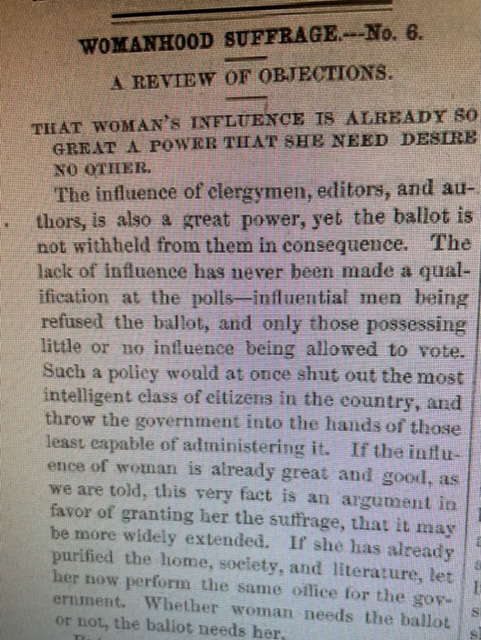“Whether woman needs the ballot or not, the ballot needs her.”
Lavinia Goodell, June 1871
In 1871, shortly before she gave up her job at Harper’s Bazar in New York City and moved to Wisconsin to look after her elderly parents,
Lavinia Goodell wrote a series of articles for the Woman’s Journal dispelling common myths on why women should not vote. In a piece that appeared in the June 23, 1871 issue of the Woman’s Journal, refuted the notions that women already held such broad influence that they did not need the franchise; that suffrage would do working women no good; and that women did not actually want to vote. She began:

Lavinia said women did need the ballot, particularly women of little means. “The women who possess the greatest social influence are those who need it least for the protection of their interests…. The poor working women, the widows and orphans, whose facts are worn with care and anxiety, and whose clothing is plain and meager, possess little of this influence. These are they who need the protection of the ballot.”
As to the claim that the right to vote would not help working women, Lavinia said:
It is true that, as a rule, wages are not affected by the ballot. To this rule, however, there is one important exception. This is in the case of government employees…. That as a matter of fact the best offices ae given to voters, is too well known to be disputed. Many of these offices could be quite as well filled by women as by men, and the result would be a relief to departments of female industry ow overcrowded. This is one way in which the ballot would aid working women.
She noted that women school teachers would also be helped by the franchise since teachers’ salaries are appointed by officers chosen by the voters. She reasoned that if women public school teachers had a voice in the election of those officers, that voice would no doubt be given to the candidate pledged to secure them justice. She added that the preparation required to thoughtfully vote in elections would itself be a boon for women:
The necessary reading, thinking and investigating which the exercise of the franchise would involve will be another benefit to working women. Ignorance is always a great disadvantage to the worker. Intelligence and thought, a knowledge of the laws and institutions of the country, would not only qualify her for more valuable service, but would enable her to guard her interests more wisely and effectively.
To those who claimed most women did not want to vote, Lavinia offered a simple solution: “Since it would be ‘unjust and oppressive’ to ‘thrust’ the ballot into unwilling hands, and since it would be equally unjust to withhold it if a majority of women desire it, nothing remains but to submit the question to a popular vote of the women of the country. If they decide in favor of the suffrage, so be it!”
She closed by saying:

Read the entire article here.
Sources consulted: “Womanhood Suffrage – No. 6, a Review of Objections,” written by Lavinia Goodell, published in the Woman’s Journal, Vol. 2, no. 22, June 3, 1871, seq. 181, Schlesinger Library, Radcliffe Institute, Harvard University.







